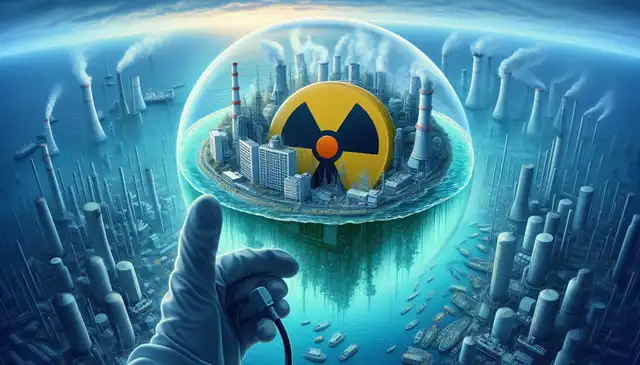Tritium Detection in Fukushima’s Seawater: Below Safety Standards
- Normal Liver Cells Found to Promote Cancer Metastasis to the Liver
- Nearly 80% Complete Remission: Breakthrough in ADC Anti-Tumor Treatment
- Vaccination Against Common Diseases May Prevent Dementia!
- New Alzheimer’s Disease (AD) Diagnosis and Staging Criteria
- Breakthrough in Alzheimer’s Disease: New Nasal Spray Halts Cognitive Decline by Targeting Toxic Protein
- Can the Tap Water at the Paris Olympics be Drunk Directly?
Tritium Detection in Fukushima’s Seawater: Below Safety Standards
- Should China be held legally responsible for the US’s $18 trillion COVID losses?
- CT Radiation Exposure Linked to Blood Cancer in Children and Adolescents
- FDA has mandated a top-level black box warning for all marketed CAR-T therapies
- Can people with high blood pressure eat peanuts?
- What is the difference between dopamine and dobutamine?
- How long can the patient live after heart stent surgery?
Tritium Detection in Fukushima’s Seawater: Below Safety Standards
Questions Raised Over Headline Reporting “Traces of Tritium Detected” Significantly Below Drinking Water Standards, “Comparable to Salt Levels in Seawater”.
Concerns have been raised over some reports that highlighted “traces of tritium detected in seawater” regarding the release of treated water from the Fukushima Daiichi Nuclear Power Plant.
On May 7th, TEPCO detected 13 becquerels of the radioactive substance tritium per liter in seawater near the Fukushima Daiichi Nuclear Power Plant. However, this amount is far below the drinking water standard of 10,000 becquerels per liter set by the World Health Organization (WHO).
While it is a fact that tritium was detected, some comments on social media criticized the reporting for potentially stirring up anxiety by not including the phrase “below the standard” in the headline, with some likening it to reporting “detecting salt in seawater.”

“There is no problem with 13 becquerels as a drinking water standard. I want objective facts about safety to be reported. Reporting only on detection is not journalism,” said Goshi Hosono, former Minister of the Environment for the Liberal Democratic Party, in an interview with the Sankei Shimbun on the 8th.
Contaminated water generated at the Fukushima Daiichi Nuclear Power Plant is treated with the Multi-nuclide Removal Facility (ALPS), which removes most radioactive substances. However, tritium cannot be removed. This tritium water is diluted by over 100 times with seawater, and after diluting the concentration to less than one-fourth of the national discharge standard (less than 1500 becquerels per liter), it is released into the ocean.
Tritium is naturally present in the environment and is also found in trace amounts in the human body. There have been no confirmed effects on human health or the environment near nuclear power facilities overseas. Regarding the headlines in some reports, there are also voices on social media expressing concern about reputational damage.
An account that disseminates information on electricity, energy, and environmental issues, “Bunden Denko FC,” pointed out on X on the 8th, “What is the point of this title? Are they trying to say Fukushima is dangerous? If so, this article is causing reputational damage.”
Kimi Onoda, a member of the House of Councillors from the Liberal Democratic Party, also posted on X on the 8th, “The title is really damaging to the reputation…”
Kohei Watanabe, a Fukushima prefectural assembly member from the Liberal Democratic Party, also wrote on X on the 8th, “It’s a report at the level of ‘salt detected in seawater.'”
Journalist Tomohiro Hayashi, who lives in Fukushima and investigates the actual situation of reputational damage due to the nuclear accident, also expressed criticism on X on the 8th, saying, “It’s comparable to ‘salt detected in seawater.'”
Shuji Akutsu, who farms in Samegawa Village, Fukushima Prefecture, also criticized on X on the 8th, saying, “Are they saying there is no tritium in seawater? This is an extremely malicious report just to find fault. Fukushima Prefecture should strongly protest.”
The appropriate title for the article, generated by a net user using the AI “Chat GPT,” was “Tritium Detected Below Standard.”
Tritium Detection in Fukushima’s Seawater: Below Safety Standards
(source:internet, reference only)
Disclaimer of medicaltrend.org
Important Note: The information provided is for informational purposes only and should not be considered as medical advice.



